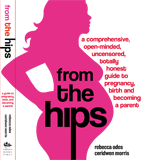new rules to sleep by
The AAP just came out with a new statement on SIDS and sleep. The big changes: they're now explicitly anti-cosleeping. So much for our theory that Dr. Sears had hijacked the AAP, per their new breastfeeding policy. When they mentioned the benefits of maternal proximity in the February policy, we were half-expecting an endorsement of co-sleeping in this one. Au contraire. According to the new policy, Room sharing=good. Bed sharing=bad. The story on co-sleeping is awfully confusing. The stats on babies being suffocated are so scary, but we wonder...What if risk factors like parental smoking, drinking, and unsafe bedding were removed from the picture? Does a study exist that accounts for these variables?
The new recommendations also discourage side-sleeping, formerly presented as an alternative to back sleeping, especially for babies who wouldn't sleep on their backs. We both relied on side sleeping a lot in our babies' early days. Again, you can't argue with safety, but if side sleeping is discouraged because of instability, is it possible to define safe parameters for side sleeping, or are parents simply being asked to remove this entirely from their toolbox?
One tool that parents are being actively encouraged to use by the AAP is the pacifier. Pacifier use may be associated with lower SIDS rates, maybe because pacifiers discourage babies from entering the deepest sleep states (interestingly, co-sleeping is also associated with less deep sleep). However, the pacifier advice seems a wee bit unrealistic:
"Consider offering a pacifier at nap time and bedtime: The pacifier should be used when placing infant down for sleep and not be reinserted once the infant falls asleep."
If there is a parent in the world who has successfully trained a baby to use a pacifier to get to sleep but not to get back to sleep, please come forward. As far as we know, it's impossible.
Because the AAP is the ultimate authority on child safety, we often feel like we have no choice but to do what they say. After all, who wants to put their baby at risk? But our question is, how real are these risks in the contexts of our lives? As parents who make educated choices, are we obligated to follow these recommendations to the letter, or should we assume that they're coming from the same alarmist/paranoid better-scared-than-sorry universe that drives the whole freakin' medical industrial complex? We're at a loss.
Here's what some other people have to say on the subject:
in baby













